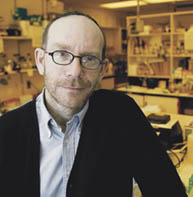Headliners: From difficult divas to C. difficile
Headliners: From difficult divas to C. difficile McGill University
User Tools (skip):
HEADLINERS
From difficult divas to C. difficile
Oops, we did it again
Last issue, this column carried an item in which Gordon Bloom, professor in the Department of Kinesiology and Physical Education, was asked his expert opinion on the chances of Britney Spears making a comeback following her now legendary MTV Awards debacle—marking the first, and we thought last, time a McGill expert was asked to comment on Spears. Apparently, we were wrong. In a recent Montreal Gazette feature chronicling the very public falls of divas like Spears, Paris Hilton and Lindsay Lohan, Will Straw, director of the McGill Institute for the Study of Canada and cultural commentator, was asked what he made of it all. "In an age of Latino and Afro-American divas, it's interesting that it's the most waspy/Euro ones who are melting down," said Straw, "suggesting that they're cut loose from the sense of community or movement that might help the others stay a little together."
Chart topper

LEVITIN: Literary stock on the rise
OWEN EGAN
If you didn't read Dan Levitin's best-seller, This is Your Brain on Music, the first time around in hardcover, grab it while you can in paperback. Having worked as a producer and sound designer on albums by Blue Öyster Cult and Chris Isaak and as a recording engineer for Santana and The Grateful Dead, the founder of McGill's Levitin Lab for Music Perception, Cognition and Expertise knows a thing or two about making a Top 40 list. This is Your Brain on Music made the New York Times bestseller list in hardcover and now the paperback has as well. Levitin's exploration of why we love music and how it does what it does to us is climbing other non-fiction paperback best-seller lists throughout North America, including The Boston Globe, The Globe and Mail, Los Angeles Times, San Francisco Chronicle, BookSense and BookManager (Canada).
Soap and water wins hands down
It looks like grandma was right: soap and water can't be beat. A recent study looking at the effectiveness of five different hand-washing methods in disinfecting the hands of volunteers contaminated with C. difficile demonstrated that a good scrub with soap and water eliminated more than 98 percent of bacteria. Surprisingly, those alcohol-based solutions that are all the rage in hospitals these days eliminated almost none. Dr. Matthew Oughton of the division of infectious diseases at the McGill University Health Centre and one of the study's lead authors explained to CBC that while the alcohol-based disinfectants did kill most of the living C. difficile bacteria, it was ineffective against the spores produced by the bacteria—leaving contaminated people susceptible to infection.
Szyf goes coast-to-coast

SZYF: Garnering national attention
Moshe Szyf was featured on CBC's The National recently. In a piece on the burgeoning field of epigentics, the pharmacology and therapeutics researcher was touted as one of the field's pioneers and his work with Michael Meaney from the Department of Psychiatry was highlighted. Their seminal study found that the quality of maternal care received by rat pups altered the way their genes were expressed later in life. Despite his growing status in the field, Szyf hasn't let stardom get to his head. "We should be quite humble about how little we know about [epigenetics]," he said.

